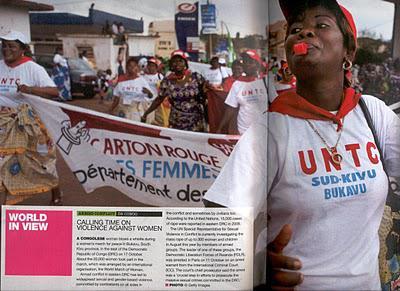As part of my course every seminar on Feminist Perspectives of International Law I have to present a cutting or example of something relating to the topic, creating what's known as a Reflective Log:

Amnesty Magazine, Issue 164. Nov/Dec 2010*
This article from the Amnesty International Magazine praises the efforts of the World March of Women who organised a march in the Democratic Republic of Congo (DRC) protesting and promoting awareness of sexual and gender-based violence during the conflict in eastern DRC. The articles states that 15,000 cases of rape were reported in eastern DRC in 2009. The march was held just a few days after the arrest of one of the leaders of the armed groups, who was said to have orchestrated the mass rape of around 300 women and children.
The use of sexual violence during armed conflict has been widely overlooked in the international sphere, where the more immediate threat of conflict and political unrest takes centre stage, as Margot Wallström, the Secretary-General’s Special Representative on Sexual Violence in Conflict, stated: "rape is not a lesser evil on the hierarchy of wartime horrors."[1] In some cases genocidal rape is used as a weapon or tactic of conflict, with some military directions actually to rape women and girls. This was seen, perhaps most prominently, in the Rwanda genocide, in which members of the Hutu ethnic group attacked, killed and forced out the Tutsi population. Many rapes were ‘purposely voyeuristic,’[2] the perpetrators in the Rwandan genocide knew that the humiliation was to the community overall. “Raping Tutsi women in large numbers would make it difficult for Tutsis to continue their social existence.”[3] Rape is not necessarily sexual, but a display of dominance or an attempt to exert power, women are often at risk from the very people who are supposed to be there to protect them, the officials.Action of the International Criminal Court (ICC) in prosecuting those guilty of committing, planning and using violence against women, sexual and otherwise, as a form of conflict against society is the first step to overcoming the issue. The actions of international organisations such as the UN are also progressive steps, however, it might have taken the creation of an International Agency for Women (known as UN Women) to start the ball rolling. "Rape must not be dismissed as collateral damage, or cultural, or inevitable, for it is one of the great peace and security challenges of our time," said Margot Wallström.Most people will step forward and demand an Aids free world, but does it take a woman to stand up and say we want a world free of sexual violence?
*Click the caption below the picture to see a bigger version so you can read the article.
[1] United Nations Press Conference by The Special Representative on Sexual Violence in Conflict[2] C W Mullins, ‘“We Are Going To Rape You And Taste Tutsi Women”: Rape During the 1994 Rwandan Genocide’ (2009) 49(6) BJC 719[3]J. Quigley The Genocide Convention: An International Law Analysis (Ashgate 2006)


